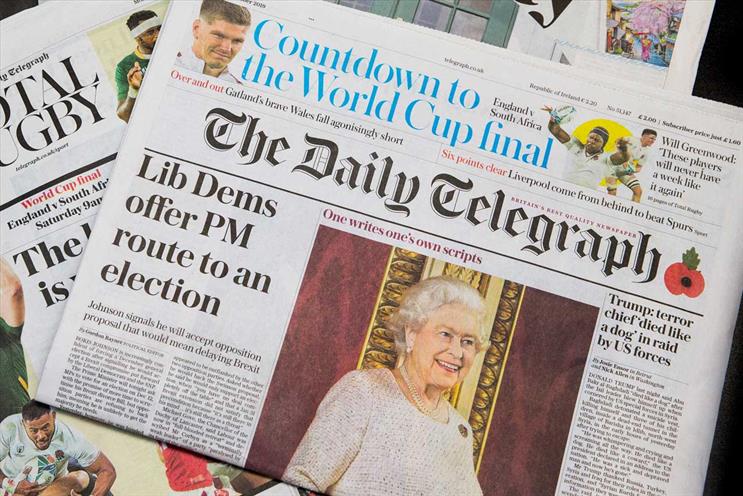
Telegraph Media Group has disclosed for the first time in its annual accounts that it pays rebates to media agencies and clients.
"These rebates can take the form of cash payments, free advertising space or a mixture of both," the accounts said.
Rebates are common in UK advertising, but the practice of media owners making such payments to agencies in return for agreed volumes of spend is rarely discussed openly.
Big agency groups have come under scrutiny, particularly in the US, amid questions of transparency about whether they are disclosing rebates to their clients.
TMG’s accounts said: "The company enters into agreements with advertising agencies and certain clients, which are subject to a minimum spend and typically include a commitment to deliver rebates to the agency or client based on the level and share of the spend over the contract period."
A spokesman for the owner of The Daily Telegraph declined to comment further on rebates.
Turnover at TMG fell 2.4% to £271.4m for the year to December 2018 as the accounts said "continued structural decline in print advertising and newspaper circulation" was partly offset by "growth in subscriber volumes and revenues".
The publisher wants to hit 10 million registered users and one million paying subscribers by 2023 – something that Nick Hugh, chief executive of TMG, has called the "10-1-23 strategy".
Better data on readers and their habits "allows us to sensitively send more targeted offers and data-informed advertising – all within a premium context and environment", the accounts said.
The publication of TMG’s annual report comes as its owner, the Barclay family, considers selling the newspaper group.
The Times, which broke the news of a potential sale, said it would be part of a wider shake-up of the Barclays' interests, which include The Ritz in London and Shop Direct.
'A fact of life about how media gets traded'
TMG is the fourth of the large UK newspaper publishers to disclose it pays rebates.
北京赛车pk10 previously reported that DMGT first revealed the payment of rebates in its 2015 accounts.
Guardian Media Group and two News UK subsidiaries, Times Newspapers and News Group Newspapers, the owner of The Sun, followed when they disclosed rebates for the first time in their respective 2016 accounts.
TMG, which employs PwC as its auditor, used similar accounting language as its counterparts to describe the rebates in its accounts.
DMGT is the only publisher to give a figure for its rebate "provision", saying it set aside £22.1m for "contract discounts and rebates" in its latest accounts – a disclosure that indicates rebates can involve large sums.
UK agency groups have always maintained that they are transparent about receiving rebates and use them to reduce fees or offer cheaper prices to clients.
Some agencies, particularly in the independent sector, say they will not keep rebates on principle.
David Pemsel, outgoing chief executive of GMG, told 北京赛车pk10 in an interview last year that he regarded rebates as "a fact of life about how media gets traded", even though "we can debate the pros and cons" of such payments.
Pemsel hinted that wider structural changes in the media industry could lead to agencies changing the way they do business.
"One needs to go to the other end of the telescope [from rebates] and let’s just work out the true definition of the role the media agency plays now, with the increased consolidation of investment happening in very few places," Pemsel said at the time.




.jpg)
.jpeg)
